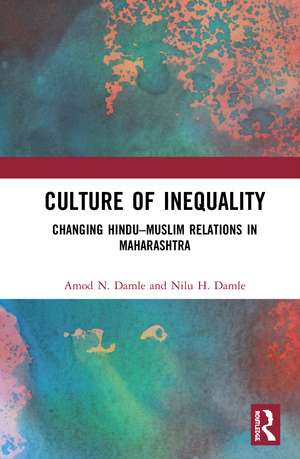Culture of Inequality: The Changing Hindu–Muslim Relations in Maharashtra
Autor Amod N. Damle, Nilu H. Damleen Limba Engleză Hardback – 23 oct 2020
The volume focusses on how the realization of cultural distinctiveness, politics of identity, and the struggle for dominance have played a role in shaping Hindu–Muslim relations in Maharashtra. Through field interviews conducted over three years, the authors contextualise and analyse the nature of cultural hybridity in Kurundwad and how the relationship has changed over the years. The book also focusses on notions of tolerance and inequality, and provides insights into the reasons for the growing distinctiveness in cultural and religious identity in Kurundwad since the 1990s, in the aftermath of the demolition of the Babri Masjid and the Shah Banu verdict.
The book provides a comprehensive framework for understanding the relationship between Hindus and Muslims in India. It will be of great interest to researchers and students of sociology, politics, modern history, cultural studies, minority studies, and South Asian studies.
| Toate formatele și edițiile | Preț | Express |
|---|---|---|
| Paperback (1) | 380.84 lei 6-8 săpt. | |
| Taylor & Francis – 25 sep 2023 | 380.84 lei 6-8 săpt. | |
| Hardback (1) | 999.02 lei 6-8 săpt. | |
| Taylor & Francis – 23 oct 2020 | 999.02 lei 6-8 săpt. |
Preț: 999.02 lei
Preț vechi: 1218.32 lei
-18% Nou
Puncte Express: 1499
Preț estimativ în valută:
191.16€ • 200.12$ • 158.17£
191.16€ • 200.12$ • 158.17£
Carte tipărită la comandă
Livrare economică 05-19 aprilie
Preluare comenzi: 021 569.72.76
Specificații
ISBN-13: 9780367819422
ISBN-10: 0367819422
Pagini: 168
Ilustrații: 9 Halftones, black and white; 1 Tables, black and white; 9 Illustrations, black and white
Dimensiuni: 156 x 234 x 11 mm
Greutate: 0.42 kg
Ediția:1
Editura: Taylor & Francis
Colecția Routledge India
Locul publicării:Oxford, United Kingdom
ISBN-10: 0367819422
Pagini: 168
Ilustrații: 9 Halftones, black and white; 1 Tables, black and white; 9 Illustrations, black and white
Dimensiuni: 156 x 234 x 11 mm
Greutate: 0.42 kg
Ediția:1
Editura: Taylor & Francis
Colecția Routledge India
Locul publicării:Oxford, United Kingdom
Public țintă
PostgraduateCuprins
List of Figures. Acknowledgements. 1. Introduction 2. The Arrival of Islam in the Deccan 3. Cultural and Religious Exchange between Hinduism and Islam 4. Cultural Change in Kurundwad 5. Why is Kurundwad Changing? 6. Culture and Inequality 7. The Changing Hindu-Muslim Relations in Maharashtra 8. Concluding Remarks. Index.
Notă biografică
Amod Damle has been involved in research which applies design and systems thinking to the study of intercultural conflict. Damle received a BA in fine arts from Sir J. J. School of Art, Mumbai, and a master’s in industrial design and a PhD in systems engineering from the Ohio State University. He has published his research in leading peer-reviewed journals, such as Human Factors and Design Studies. Damle published two novels in 2018, In the Middle and The Edible Goddess, both dealing with the theme of cultural polarization in the Indian subcontinent. Currently, he is a faculty member in the College of Innovation and Design at Boise State University.
Nilu Damle is a writer and a journalist. Author of 23 books, Damle has conducted fieldwork in Palestine, Afghanistan, Europe, Africa, and South Asia. In a career spanning 50 years, he has written extensively about politics and culture. In Malegaon (2008), Damle performed a socio-cultural analysis of Malegaon and its Muslim community. In 1991, he produced a magazine-format TV show, Dindi, for Doordarshan with Vijay Tendulkar. Damle examined the impact of satellite television on Indian culture for the Institute of Development Studies, University of Sussex. He has conducted research studies for the Indian Council for Social Science Research and Ford Foundation.
Nilu Damle is a writer and a journalist. Author of 23 books, Damle has conducted fieldwork in Palestine, Afghanistan, Europe, Africa, and South Asia. In a career spanning 50 years, he has written extensively about politics and culture. In Malegaon (2008), Damle performed a socio-cultural analysis of Malegaon and its Muslim community. In 1991, he produced a magazine-format TV show, Dindi, for Doordarshan with Vijay Tendulkar. Damle examined the impact of satellite television on Indian culture for the Institute of Development Studies, University of Sussex. He has conducted research studies for the Indian Council for Social Science Research and Ford Foundation.
Descriere
This book offers a historical perspective on the changing Hindu–Muslim relationship in India through a study of syncretic traditions in Kurundwad, Maharashtra. It explores the social and cultural dynamics between the two communities and analyses underlying issues of caste hierarchy, Hindu hegemony, and social dominance.
